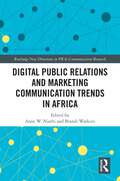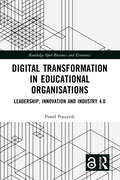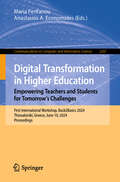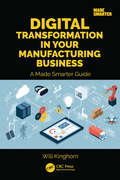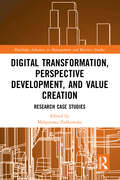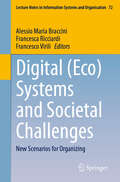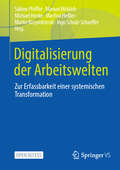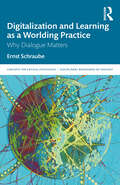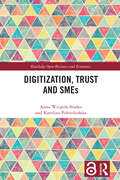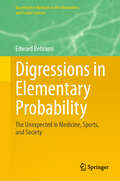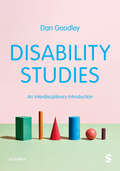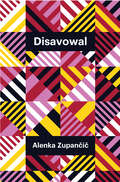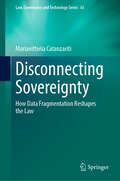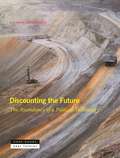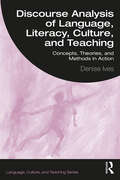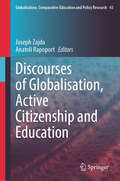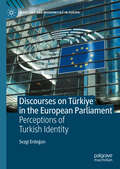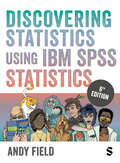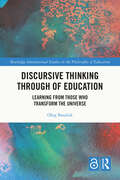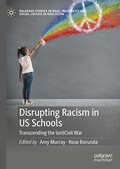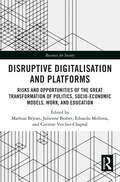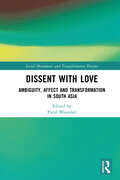- Table View
- List View
Digital Public Relations and Marketing Communication Trends in Africa (Routledge New Directions in PR & Communication Research)
by Brandi Watkins Anne W. NjathiThe uptake of digital media platforms necessitates the need to understand how digital cultures of consumers and brands are unfolding. Despite the increase in usage and adoption of the internet in Africa, there is limited information about digital marketing trends on the continent. This book is among the first to present an edited collection of chapters on digital and influencer marketing authored by many who are either from or have close ties to Africa.This book showcases digital marketing trends in Africa that are burgeoning at the same speed as the uptake of technology in the continent. With this in mind, the contributors seek to interrogate digital marketing trends in two stages: the status of digital marketing on the African continent, including cases from Nigeria, Egypt, Uganda and Kenya, and an analysis of the rise of influencer marketing, including cases from Nigeria and Uganda. This book will explore factors driving the increase in digital media platforms in Africa as well as an analysis of the implications of the growth in digital marketing, using various theoretical and methodological underpinnings to probe trends.Digital Public Relations and Marketing Communication Trends in Africa provides significant implications for marketing scholars and researchers and will be relevant to those looking to understand the opportunities and challenges ahead.
Digital Transformation in Educational Organizations: Leadership, Innovation and Industry 4.0 (Routledge Open Business and Economics)
by Paweł PoszytekTechnological transformation should lead to enhance people’s potential and the development of their cognitive and social competences, especially those connected with effective communication on different levels. The COVID-19 pandemic has intensified all these processes and, for better resilience and effectiveness at work, it requires now different sets of competences. This book gives direct insight into changes that take place in education in the context of an unprecedented and rapid technological advancement, which requires the reorientation of goals and functions based on innovative, adaptive and flexible solutions – in most cases driven by individual leadership. It describes the way to reach this reorientation and shows through thorough research how educational leaders position themselves on this way in this fast-changing ecosystem. Exploring how educational leaders manage the challenges of digital transformation, using European collaborative projects, this research volume discusses how this process impacts the effectiveness and sustainability of organizational activities. Establishing a model for assessing digital transformation in educational organizations and evaluating the effectiveness of their leaders, it will be of value to researchers, academics, practitioners, and advanced students in the fields of leadership, organizational change, management of technology and innovation, and those interested in the development of education and the utilization of digitalization.
Digital Transformation in Higher Education. Empowering Teachers and Students for Tomorrow’s Challenges: First International Workshop, Back2Basics 2024, Thessaloniki, Greece, June 10, 2024, Proceedings (Communications in Computer and Information Science #2247)
by Maria Perifanou Anastasios A. EconomidesThis book constitutes the refereed proceedings of the First International Workshop on Digital Transformation in Higher Education. Empowering Teachers and Students for Tomorrow’s Challenges, Back2Basics 2024, held in Thessaloniki, Greece, on June 10, 2024. This workshop was part of the 20th International Conference on Intelligent Tutoring Systems (ITS 2024), which took place in Thessaloniki on June 10–13, 2024. The 06 full papers here were thoroughly reviewed and selected from a total of 09 submissions. This interdisciplinary event brought together researchers and educators from various European higher education institutions to address the challenges and opportunities of digital transformation in higher education (HE).
Digital Transformation in Your Manufacturing Business: A Made Smarter Guide
by Will KinghornAre you a manufacturing leader and unsure of which technology can help grow your business? Have you heard about 3D printing, Industry 4.0, robots, or artificial intelligence but don’t know how they can be used in manufacturing?This book gives a clear and practical guide to manufacturing technologies, providing examples of how they’re used, as well as the tools and techniques you’ll need to get started. Each technology is covered in a brief and simple way allowing you to understand it quickly and decide if it’s worth investigating for your business.In addition to this book, the online resources will provide you with templates and examples to help you get started. At every stage there are suggestions for the key terms you will need to find more information appropriate to your industry.This isn’t just about technology, it’s a roadmap for your digital transformation. Start with guidance on setting your company’s vision and direction, to getting the people in your business engaged and ready to adopt technology. Move on to exploring each of the technologies, and the tools and techniques you’ll find useful along the way. Finally, connect the technologies with the tools that are appropriate, and look at common issues in manufacturing businesses and how these can be resolved.Get started with making informed decisions, embracing technologies, and transforming your business.
Digital Transformation, Perspective Development, and Value Creation: Research Case Studies (Routledge Advances in Management and Business Studies)
by Małgorzata PańkowskaThis edited collection aims to provide relevant theoretical frameworks and the latest empirical research findings in the area of business management. It covers case studies provided by teachers visiting the University of Economics in Katowice, Poland, within Erasmus and CEEPUS Programmes. Over 12 years, approximately 25 teachers have been coming year by year to Katowice, presenting their monographic lectures and participating in seminars on their research results and educational achievements. This book contains descriptions of case studies, elaborated by Erasmus and CEEPUS teachers, illustrating that the case study is a method of research as well as a method applied in education and emphasizing the value of qualitative methods by example of case studies. The key benefit of qualitative research is that it allows a researcher to perceive and understand context within which decisions and actions take place. Hence, to understand peoples’ motivations, their reasons, their actions, and the context for their beliefs and actions, qualitative research is the best route. Assuming that business organizations as well as individuals are entirely linked together via the Internet, a new approach to business communication and marketing, business modelling and management are developed to reveal an increase of business synergy effects, the alignment of information and communication technologies (ICT) and business and social value creation, as well as sustainability and environment protection. Through this book, readers have an opportunity to learn about relevance and rigor in qualitative research and how the case study can be applied in various organizational contexts.
Digital: New Scenarios for Organizing (Lecture Notes in Information Systems and Organisation #72)
by Francesca Ricciardi Alessio Maria Braccini Francesco ViriliThis book presents a collection of research papers that aim to elucidate the pivotal role of digital systems in driving the formation and evolution of digital ecosystems, thereby shaping new scenarios for organizing in the digital age, by considering people practices, organizational processes, and system design issues. Each chapter offers insights into the ways in which digital systems and digital ecosystems contribute to addressing societal challenges, promoting sustainable development, enhancing collaboration and mitigating the negative effects of technological disruption. Using a multidisciplinary perspective and multimethodological approaches, it explores the impact of digital (eco)systems on governance structures, economic models and social dynamics and provides insights into the transformative potential of digitalization in shaping the future of societies worldwide. The diversity of perspectives makes this book particularly relevant for academics, businesses and public sector organizations. The content of the book is based on the revised versions of a selection of the best papers presented at the annual conference of the Italian Section of the AIS in October 2023 in Turin, Italy.
Digitalisierung der Arbeitswelten: Zur Erfassbarkeit einer systemischen Transformation
by Sabine Pfeiffer Martin Krzywdzinski Ingo Schulz-Schaeffer Michael Henke Manuel Nicklich Martina HeßlerDiese Open Access Publikation bündelt Ergebnisse aus der ersten Förderphase des interdisziplinären DFG-Schwerpunktprogramms 2267 „Digitalisierung der Arbeitswelten“. Digitalisierung verändert Arbeit mit vielfältigen Konsequenzen für Arbeit(smarkt) und Qualifizierung. Wie dramatisch und grundsätzlich diese Veränderungen sind, wird seit Jahren kontrovers diskutiert und anwendungsbezogen erforscht. Das Schwerpunktprogramm nimmt die Veränderung der Arbeitsgesellschaft als Ganzes in den Blick – Geschichts-, Sozial- und Wirtschaftswissenschaften analysieren die vielschichtigen und widersprüchlichen Dynamiken als eine systemische Transformation. Leitend ist dabei die These von drei Bewegungsdynamiken: die Durchdringung (z.B. von digitalen Arbeitsprozessen), die Verfügbarmachung (z.B. von Daten über einzelne Arbeitshandlungen) und die Verselbständigung (z.B. von datengetriebenen Wertschöpfungsketten). Methodische Reflexionen zu Erfassbarkeit der Transformation runden den Band ab.
Digitalization and Learning as a Worlding Practice: Why Dialogue Matters (ISSN)
by Ernst SchraubeIn the face of a world in crisis, Digitalization and Learning as a Worlding Practice: Why Dialogue Matters examines the significance of digital technologies in human learning.The book explores how learning is not just an internalization of knowledge but a problem- oriented activity of engaging with the world, a process of both meaning making and world making. It raises a pivotal question: how can digital technologies help to expand and enrich learning as a collaborative worlding practice? It discusses the importance of digital artifacts in shaping students’ learning experiences, discerning how they nourish meaningful engagement and where they pose a hindrance. The book also investigates the role of digitalization in transforming everyday life and learning activity of students, and how learners, teachers, and educators can approach these transformations critically and constructively. Based on an embodied, subject- and world- centered concept of learning, the book offers its readers a sophisticated understanding of the inner connection between digitalization and learning.This book will appeal to students and scholars in Psychology, Education, and Science and Technology Studies, as well as to anyone concerned with the implications of digital technology for the processes of human learning.
Digitization, Trust and SMEs (Routledge Open Business and Economics)
by Anna Wziątek-Staśko Karolina PobiedzińskaThis book exposes two inspiring research categories: digitization and trust. Digitization is a phenomenon that dynamically modifies the modern world in almost every area. Modern technologies, artificial intelligence and humanoid robots are instruments with an increasingly significant impact on the shape of the management process of modern organizations, including the way people are managed. Trust is a subtle concept, with a very different interpretation, influencing the behaviour of employees in a multifaceted way. A superficial look at the combination of both categories seems to see them as irrational. Upon closer examination, however, it exposes many interesting fields of scientific exploration. Trust, as a research category, has been included in three significant dimensions: in relation to co-workers, superiors and information technology, dominated by digitization. Each draws attention to different problems of priority importance for the organization. Asserting the idea that trust in the conditions of digitization becomes a category of timeless importance in the interdisciplinary dimension, this volume will be of interest to researchers, academics, practitioners and advanced students in the fields of management of technology and innovation, organizational studies and leadership.The Open Access version of this book, available at www.taylorfrancis.com, has been made available under a Creative Commons Attribution-Non Commercial-No Derivatives (CC-BY-NC-ND) 4.0 license.
Dignity Not Debt: An Abolitionist Approach to Economic Justice
by Chrystin OndersmaAn earth-shaking reimagining of household debt that opens up a new path to financial security for all Americans. American households have a debt problem. The problem is not, as often claimed, that Americans recklessly take on too much debt. The problem is that US debt policies have no basis in reality. Weaving together the histories and trends of US debt policy with her own family story, Chrystin Ondersma debunks the myths that have long governed debt policy, like the belief that debt leads to prosperity or the claim that bad debt is the result of bad choices, both of which nest in the overarching myth of a free market unhindered by government interference and accessible to all. In place of these stale narratives, Ondersma offers a compelling, flexible, and reality-based taxonomy rooted in the internationally recognized principle of human dignity. Ondersma’s new categories of debt—grounded in abolitionist principles—revolutionize how policymakers are able to think about debt, which will in turn revolutionize the American debt landscape itself.
Digressions in Elementary Probability: The Unexpected in Medicine, Sports, and Society (Quantitative Methods in the Humanities and Social Sciences)
by Edward BeltramiThis book is about the interplay between chance and order, but limited to mostly binary events, such as success/failure as they occur in a diversity of interesting applications. The goal is to entertain and instruct with topics that range from unexpected encounters with chance in everyday experiences, to significant “must know” insights regarding human health and other concerns in the social sciences. The first section provides the tools for being able to discuss random sequences with hints at what is to follow. This is followed by another surprising and, to some extent, bizarre result known as Stein’s Paradox, which is applied to baseball. The troublesome topic of disease clusters, namely to decide whether the clumping of events is due to chance or some environmental cause, is treated using both the Poisson and normal approximations to the binomial distribution and this leads naturally into a discussion of the base rate fallacy and a case study of hospital performance. Next, another medical case study this time concerning some tricky questions about the effectiveness of colonoscopy and other medical interventions. A brief discussion of the mathematics of clinical trials, follows. Then, the book examines the error in random sampling, when polling for candidate preference with specific current examples. The essential tool here is covariance of random variables. The author follows this with a treatment of the spooky quality of coincidence using appropriate mathematical tools. After this, code breaking at Bletchley Park using Baye’s theorem. It returns to Poisson events to discuss another unexpected result, followed by the use of spatial Poisson events in the delivery of emergency response services. Finally, an account of fluctuations that occur in a run of Bernoulli trials as a bookend to the very first section of the book. The probability theory involved is elementary using the binomial theorem and its extensions to Poisson and normal events in addition to conditional probability and covariance. The author provides an optional brief tutorial at the end, that covers the basic ideas in probability and statistics needed in the main text. Besides a list of references, several codes written in Matlab that were used to illustrate various topics in the text, as well as to support several figures that appear throughout, are provided.
Disability Studies: An Interdisciplinary Introduction
by Dan GoodleyWhat if disability isn′t a problem but a resource? This updated edition of a classic text in the field of disability studies interrogates the commonly held view that disability is something that needs to be ′cured′ or ′eradicated′. It shows us how disability can challenge our thinking and help us to imagine a more socially just society, offering an engaging introduction to a diverse and globally expanding subject. Taking an interdisciplinary approach, this text will be of interest to undergraduates, graduates, and researchers across the social sciences. Making the case that disability is much more than just impairment, this book uncovers the ways in which disabled people are challenging discrimination and marginalisation. Ranging across topics such as health, activism and education, this book asks questions about the ways in which society tends to understand disability and offers alternative explanations that are more exciting, radical and transformative.
Disability Studies: An Interdisciplinary Introduction
by Dan GoodleyWhat if disability isn′t a problem but a resource? This updated edition of a classic text in the field of disability studies interrogates the commonly held view that disability is something that needs to be ′cured′ or ′eradicated′. It shows us how disability can challenge our thinking and help us to imagine a more socially just society, offering an engaging introduction to a diverse and globally expanding subject. Taking an interdisciplinary approach, this text will be of interest to undergraduates, graduates, and researchers across the social sciences. Making the case that disability is much more than just impairment, this book uncovers the ways in which disabled people are challenging discrimination and marginalisation. Ranging across topics such as health, activism and education, this book asks questions about the ways in which society tends to understand disability and offers alternative explanations that are more exciting, radical and transformative.
Disavowal (Theory Redux)
by Alenka ZupančičThis book argues that the psychoanalytic concept of disavowal best renders the structure underlying our contemporary social response to traumatic and disturbing events, from climate change to unsettling tectonic shifts in our social tissue. Unlike denialism and negation, disavowal functions by fully acknowledging what we disavow. Zupančič contends that disavowal, which sustains some belief by means of ardently proclaiming the knowledge of the opposite, is becoming a predominant feature of our social and political life. She also shows how the libidinal economy of disavowal is a key element of capitalist economy. The concept of fetishistic disavowal already exposes the objectified side of the mechanism of the disavowal, which follows the general formula: I know well, but all the same, the object-fetish allows me to disregard this knowledge. Zupančič adds another twist by showing how, in the prevailing structure of disavowal today, the mere act of declaring that we know becomes itself an object-fetish by which we intercept the reality of that very knowledge. This perverse deployment of knowledge deprives it of any reality.This structure of disavowal can be found not only in the more extreme and dramatic cases of conspiracy theories and re-emerging magical thinking, but even more so in the supposedly sober continuation of business as usual, combined with the call to adapt to the new reality. To disrupt this social embedding of disavowal, it is not enough to change the way we think: things need to change, and hence the way they think for us.
Disconnecting Sovereignty: How Data Fragmentation Reshapes the Law (Law, Governance and Technology Series #65)
by Mariavittoria CatanzaritiThis book explores the dynamic legal semantics of territory as applied to data. It offers a theoretical assessment of the legal challenges that data flows pose for the principle of territoriality and for state sovereignty more generally. The concept of sovereignty has traditionally developed in close connection with the exercise of powers over a territory, and ideas of jurisdiction have always been based on the principle of territoriality. Digitalization questions however the very idea of physical frontiers. Interconnected networks make data in effect borderless. Data can in fact be created, stored, processed, and accessed anytime and from anywhere. The idea of the book is upbeat: the law can keep pace with the ability of data to fragment reality. The condition for this is that sovereignty disconnects from territory. Disconnection is not getting rid of the territory once and for all, it only means that for data alternatives to the territorial connection exist. The analysis focuses on data from a holistic perspective (personal and nonpersonal) with the aim of investigating divergent and convergent solutions provided by different branches of the law (data protection, IP law, international law, and fundamental rights protection). It assesses in particular, the relationships between digitalization and the principle of territoriality, focusing on the specific legal aspects: the connections between law and territory; the impact of digitalization on state sovereignty; the use of extraterritoriality to circumvent territorial limitations on data flows; the rise of digital jurisdiction and its challenges; the interplay between digital jurisdiction and state sovereignty, and the alternative technological and legal solutions to data localization.
Discounting the Future: The Ascendancy of a Political Technology
by Liliana DoganovaA pioneering exploration of the defining traits and contradictions of our relationship to the future through the lens of discountingForest fires, droughts, and rising sea levels beg a nagging question: have we lost our capacity to act on the future? Liliana Doganova&’s book sheds new light on this anxious query. It argues that our relationship to the future has been trapped in the gears of a device called discounting. While its incidence remains little known, discounting has long been entrenched in market and policy practices, shaping the ways firms and governments look to the future and make decisions accordingly. Thus, a sociological account of discounting formulas has become urgent.Discounting means valuing things through the flows of costs and benefits that they are likely to generate in the future, with these future flows being literally dis-counted as they are translated in the present. How have we come to think of the future, and of valuation, in such terms? Building on original empirical research in the historical sociology of discounting, Doganova takes us to some of the sites and moments in which discounting took shape and gained momentum: valuation of European forests in the eighteenth and nineteenth centuries; economic theories devised in the early 1900s; debates over business strategies in the postwar era; investor-state disputes over the nationalization of natural resources; and drug development in the biopharmaceutical industry today. Weaving these threads together, the book pleads for an understanding of discounting as a political technology, and of the future as a contested domain.
Discourse Analysis of Language, Literacy, Culture, and Teaching: Concepts, Theories, and Methods in Action (Language, Culture, and Teaching Series)
by Denise IvesAn essential text on discourse theory and analytic methods, this book demonstrates the possibilities of using discourse analysis to better understand language, literacy, culture, and teaching. Each chapter provides coherent, extended examples of individuals engaged in the process of doing discourse analysis. The narrative approach highlights the individual experiences of the discourse analysts and provides a unique, inside-the-mind view of the process and choices along the way. Across the book, stories describe processes involved in analyses, including identifying aims, formulating questions, selecting discourse, transcribing oral and multimodal discourse, translating discourse, chunking discourse, choosing and applying discourse and other theory, generating and supporting claims, and communicating findings. Chapters also feature sidebars with key theories and methods, recommended readings, and additional resources. This book is ideal for courses on discourse analysis, qualitative research, or language, literacy, culture, and teaching. Readers are invited to imagine the possibilities for using discourse analysis to answer their own questions.
Discourses of Globalisation, Active Citizenship and Education (Globalisation, Comparative Education and Policy Research #43)
by Joseph Zajda Anatoli RapoportThis book analyses dominant discourses of globalisation, and citizenship in schools. Diverse worldviews and ideologies construct different meanings for globalization, citizenship, and education, resulting in conceptual debates, tensions, competing discourses, and practical challenges for scholars and educators, navigating complex and contested terrain. The chapters in this volume advance further the discussions on the phenomenon of globalisation, and how it impacts on the nature of active citizenship education in schools around the world. In order to help students recognize that they are inherently global citizens, capable of understanding that local actions are globally interdependent, and that communities can be seen as temporal social networks within and beyond physical space, and action for global citizenship in school. The book, by building on intercultural dialogue and active citizenship education in schools, will promote critical appraisal of various views of the world, andoffers different ways to reconstruct and re-imagine social reality.
Discourses on Türkiye in the European Parliament: Perceptions of Turkish Identity (Identities and Modernities in Europe)
by Sezgi ErdoğanThis book analyses how Türkiye and Europe were discursively constructed through the representations of Türkiye in the European Parliament (EP) between 2007 and 2015. By providing an in-depth analysis of the discursive representations of Türkiye in the EP, the book discusses the European perception of Turkish identity and, in turn, reveals the different visions of Europe that these EP discourses relationally construct in Türkiye’s de-Europeanization process, compared to its Europeanization process in the 1997-2007 term. This book will be of interest to scholars and students of Political Sociology, International Relations, Discourse Analysis, European Studies, Turkish Studies, and Identity Studies.
Discovering Statistics Using IBM SPSS Statistics
by Andy FieldWith its unique combination of humour and step-by-step instruction, this award-winning book is the statistics lifesaver for everyone. From initial theory through to regression, factor analysis and multilevel modelling, Andy Field animates statistics and SPSS software with his famously bizarre examples and activities. Features: • Flexible coverage to support students across disciplines and degree programmes • Can support classroom or lab learning and assessment • Analysis of real data with opportunities to practice statistical skills • Highlights common misconceptions and errors • A revamped online resource that uses video, case studies, datasets, testbanks and more to help students negotiate project work, master data management techniques, and apply key writing and employability skills • Covers the range of versions of IBM SPSS Statistics©. All the online resources above (video, case studies, datasets, testbanks) can be easily integrated into your institution′s virtual learning environment or learning management system. This allows you to customize and curate content for use in module preparation, delivery and assessment.
Discovering Statistics Using IBM SPSS Statistics
by Andy FieldWith its unique combination of humour and step-by-step instruction, this award-winning book is the statistics lifesaver for everyone. From initial theory through to regression, factor analysis and multilevel modelling, Andy Field animates statistics and SPSS software with his famously bizarre examples and activities. Features: • Flexible coverage to support students across disciplines and degree programmes • Can support classroom or lab learning and assessment • Analysis of real data with opportunities to practice statistical skills • Highlights common misconceptions and errors • A revamped online resource that uses video, case studies, datasets, testbanks and more to help students negotiate project work, master data management techniques, and apply key writing and employability skills • Covers the range of versions of IBM SPSS Statistics©. All the online resources above (video, case studies, datasets, testbanks) can be easily integrated into your institution′s virtual learning environment or learning management system. This allows you to customize and curate content for use in module preparation, delivery and assessment.
Discursive Thinking Through of Education: Learning from Those Who Transform the Universe (Routledge International Studies in the Philosophy of Education)
by Oleg BazalukThis book is a contribution to the philosophical discourse on education. Education is considered as a tool of philosophy. Education (paideia) and politics (politeia) are equal in importance for building a sustainable society free from feud and unhappiness. Discursive thinking through of education is based on Plato’s dialogues and the results of epistemological, metaphysical and ethical research in the fields of cosmology, biology and neuroscience. The author demonstrates the potential of the threefold scheme of philosophy, a Platone philosophandi ratio triplex, for ordering individual and collective discourse and way of life in strict accordance with the intelligible complexity of the expanding cosmos. An essential read for students and scholars interested in the crossroad between education and philosophy.
Disrupting Racism in US Schools: Transcending the (un)Civil War (Palgrave Studies in Race, Inequality and Social Justice in Education)
by Amy Murray Rose BorundaThis edited volume brings together authors from various cultural backgrounds to address the racialized roots of the (un)civil war in American society and schooling. While exposing substractive schooling practices, it also provides counter-narrative school curriculum that builds cross-cultural bridges and connects learners across racial lines. It also includes critical reading and discussion questions for students in the fields of education, school leadership, sociology, ethnic studies, history, school teacher and counselor preparation, psychology, and public policy. In bringing together a wide collaboration of authors, the text models the practices of inclusion that must occur in order to transform American public education beyond its racialized roots.
Disruptive Digitalisation and Platforms: Risks and Opportunities of the Great Transformation of Politics, Socio-economic Models, Work, and Education (Business for Society)
by Mathias Béjean, Julienne Brabet, Edoardo Mollona, and Corinne Vercher-ChaptalThis book provides an overview of the opportunities and risks of digitalisation and the platforms that embody it and constitute society's new infrastructure. From a management point of view – defined here as the steering of organised and finalised collective action – understanding this major socio-technical disruption is paramount. The book helps to comprehend its main players, such as the American GAFAM, their power and its sources, their architecture, and their impact on different industries and professions, labour markets, companies, and education.Responding to the dominance of tech giants, numerous initiatives are striving to regulate their influence, safeguard democratic sovereignty, promote fair competition in the digital sphere, and employ frugal digitalisation methods to counteract detrimental aspects of these “oligopolistic” platforms. In essence, shouldn't the overarching aim of digitalisation be to foster community development, strengthen individual and collective capabilities, and preserve the environment, while producing goods and services to meet shared societal interests? Throughout the four sections of this book and its 16 chapters, actors in the digital process and/or academics provide analyses and illustrations of the great digital transformation, examining the ways in which socio-technical advances can be created or used for the benefit of all, while avoiding major risks.
Dissent with Love: Ambiguity, Affect and Transformation in South Asia (Social Movements and Transformative Dissent)
by Parul BhandariThis book presents a unique rendering of love in South Asia by reading love through the specific lens of dissent. It presents multiple articulations of dissenting love in contemporary South Asia including negotiations with parents to assert choice of partner, migration, elopement, live-in relationships, singlehood, ‘new’ ideas of masculinities, and embracing diverse sexual identities. It studies these forms of dissent in the context of changing legal discourses, impact of media in everyday life, and transforming social attitudes. As such, this book is the first of its kind to analyse the myriad ways in which love and dissent constitute each other shaping the social, political, and cultural mores and movements of South Asia. The contributions are based on ethnographic research cutting across diverse religious, ethnic, and gender and sexual identities of South Asia.Part of the Social Movements and Transformative Dissent series, this book will be of interest to students and researchers of sociology, anthropology, history, geography, political science, gender studies, and media studies. It will also appeal to academics who study South Asia with a special focus on love, intimacy, sexuality, marriage, migration, history, politics and media.
